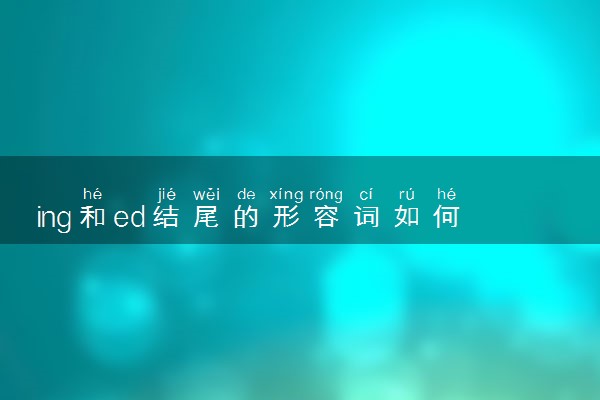专为高中生提供有价值的资讯
以ing结尾的动词变化而来的形容词一般修饰物,译为“令人…的”,常作定语;以-ed 结尾的动词变化而来的形容词一般修饰人,译为“(人)…的”,表示人所处的心理状态,常作表语。

Hello everyone and welcome back to English with Lucy
大家好,欢迎来到跟着 Lucy 学英语。
Before we get started, I'm sorry but my neighbour has decided to have some sort of Monday afternoon party in their flat and if you hear any music, it's not me it's them
在我们开始今天的课程之前,我想说,很抱歉我的邻居们今天决定在他们的公寓里举行周一下午派对,如果你听到音乐,那是他们,可不是我。
Little bit awkward, but I'm too British to say anything so I'm just going to battle on.
虽然有点尴尬,但是你也知道作为英国人,我是不会说出来的,随他们去吧。
Today I've got a very short but very useful little video for you.
今天的课程很短,但是非常有用。
It's all about adjectives that end in -ing and adjectives that end in -ed and why they're different and when we use each one.
它是关于以 - ing 和 -ed 结尾的形容词的,为什么它们会有区别以及分别该在什么情况下使用它们。
I hear so many people using these adjectives incorrectly.
我常常听到很多人错误地使用这些形容词。
So. . . . I'm here to help you!
所以呢,我来帮助你们啦。
Now, I like to believe that my lessons here on my Youtube channel will help you with your English really rather a lot.
我相信我 youtube 频道上的课程能给你们的英语学习带来很大帮助。
However if you want to take your English speaking to the next level, you're going to need to start talking with natives.
但是如果你想让你的英语口语水平到达一个新的高度,你还是需要与母语人士交谈。
Now I know that getting a private tutor or finding native people in your area isn't possible for everyone.
我也知道每个人都去找一个私人教师或者母语人士是不可能的。
So I'm working with a fantastic company called italki.
所以我正在与一个很棒的公司合作,叫做 italki。
And they have over 4000 online teachers for all languages.
他们有超过 4000 名在线老师教授各种语言。
You can find fantastic qualified teachers as well as natives that are ready to have conversations with you.
你可以找到非常优秀的职业教师以及母语人士,他们等着与你进行对话。
And you'll end up paying much less that you would in a normal, private, face-to-face lesson
相较于传统的面对面的课程,这种方式的花费会少很多。
So if you log on to italki using the link that's in the description box, your account will be credited with 100 italki credits which is around $10, ummm. . . as soon as you make your first purchase
如果你用下面这个链接登录 italki 网站,你的账户会收到 100 个 italki 分值,相当于10美元的额度,对了,得在第一次充值之后才会获得。
So. . . check that out and let me know how your experience is
所以,赶紧去看看吧,然后跟我分享你的体验。
Now I'm going to give you 2 phrases.
现在我想给你们两个短句。
The first one: I am boring and the second one: I am bored.
第一个:I am boring,第二个:I am bored.
What do they mean and why are they different?
那么它们是什么意思呢,到底有什么不同?
Well! So adjectives that end in ed describe emotions.
其实呢,形容词ed结尾通常表示情感。
They tell us how someone feels about something.
它用于表达某人对某物的感受是什么样的。
OK, so I feel tired. . . I'm going to go to bed.
所以,我感觉很累......我去睡觉了。
Or I was bored in the maths lesson. . . I almost fell asleep
上数学课实在太无聊......我都快睡着了。
Adjectives ending in ing describe the thing that causes the emotion.
以 - ing 结尾的形容词通常用于描述某件事情导致了某种情绪。
So a boring maths lesson makes you feel bored.
比如:一个无聊的课程让你觉得无聊。
The maths lesson is what causes you to feel bored.
数学课让你觉得很无聊。
So the maths lesson is boring
所以数学课令人无聊。
So you could say. . .
所以你可以说......
Copyright 2019-2029 http://www.laigaokao.com 【来高考】 皖ICP备19022700号-4
声明: 本站 所有软件和文章来自互联网 如有异议 请与本站联系 本站为非赢利性网站 不接受任何赞助和广告